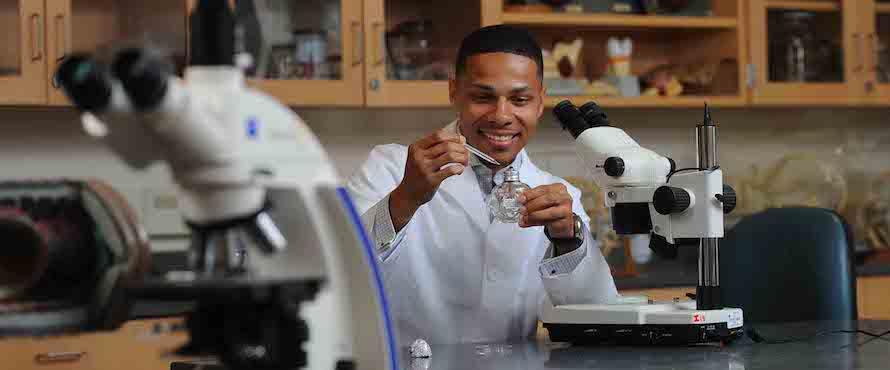News & Features
Anthony Smith likes to think of an organism like a finely tuned car.
An automobile’s power-train control module—or main computer—acts as the brain to a central nervous system, interpreting signals and sending out responses.
“In a car, there are sensors that determine the temperature of the engine, just like your skin senses temperature,” Smith said. “That information is then interpreted by the brain, which later sends output signals to elicit a response, like whether to withdraw from the temperature source.”
Smith could easily expand on the similarities between car computers and brains, but neither is his particular area of interest these days. Rather, Smith is focused on the use of nanomedicine to detect and treat the deadliest cancers at the cellular level.
That’s not exactly the career goal you might expect from a man who earned his Associate of Applied Science degree in Automotive Technology just six years ago. Then again, Smith is not your average Biology major.
Born and raised in the Englewood neighborhood on the South Side of Chicago that has long been plagued by drugs, gangs and gun violence, Smith dropped out of high school his junior year. Smith wasn’t flunking out of his classes—he just didn’t care.
“There was little to no support system for seeking higher education,” he said. “College was never an aspiration of mine, and neither my mom nor dad graduated college.”
A couple of years after dropping out, Smith completed a program to earn his high school diploma. He bounced around jobs at car dealerships and carwashes before enrolling in Kennedy-King College’s automotive program.
Believe it or not, that is where Smith discovered his love of biology. When it came time to choose his elective courses, Smith selected an entry-level biology class that captured his attention in a way nothing else ever had.
“I surprised myself how much I liked biology,” said Smith, who was encouraged by his professor, Charlie Shaw, to enroll in the Biological Sciences program after finishing at the top of his class. “I just never had the luxury of being introduced to anything in that field. The complexity of it all sparked my interest.”
Smith finished his Automotive Technology degree, then followed his newfound intellectual curiosity to Northeastern Illinois University.
“It got more complicated as I got into the higher levels,” Smith said. “It was challenging to learn new concepts.”
It was challenging, but certainly not impossible.
“Since Anthony has been at Northeastern, he has continued to challenge himself academically and scientifically,” Assistant Professor of Biology Cindy Voisine said. “In the classroom, I have noted Anthony’s inquisitiveness and curiosity regarding biological processes, asking questions to connect cellular components into a pathway.”
Smith has worked with Voisine on research of C. elegans, a 1-mm-long worm found in the soil and on fruits and vegetables. In collaboration with Northwestern University, Voisine has used the worms to sniff out the bacteria responsible for tuberculosis.
In Voisine’s lab, Smith is working on developing methodology using image analysis and computer algorithms to increase the efficiency of measuring the worms’ response to chemicals that the bacteria secrete. The goal is to develop a diagnostic device for detection of tuberculosis bacterium in patients.
Smith earned an internship with the United States Department of Agriculture after his first year at Northeastern and later earned a McNair Scholar award for students from disadvantaged backgrounds who have demonstrated strong academic potential.
Last year Smith was accepted into a Summer Research Opportunity Program at Michigan State University, where he performed research on synthesizing a nanoparticle that can detect breast cancer. In the fall, Smith was accepted as a pre-scholar in the Maximizing Access to Research Careers program before earning a full scholar position the next semester.
“I have confidence in Anthony’s ability to impact biomedical research,” Voisine said. “Not only is he capable of making significant scientific contributions, but he can also be a role model for others in STEM fields. Because of his nontraditional path to his degree, Anthony will be able to reach out to students that identify with his personal story, creating a scientific community rich in perspective and experience.”
Smith is on track to graduate with a Bachelor of Science in Biology in the spring of 2018, but that will be far from the end of his studies.
“My ultimate career goal is to earn a Ph.D.,” Smith said. “Once I obtain that, the type of research I can conduct is limitless.”
Smith hopes his story can serve as an inspiration to others who may feel uncertain about their futures. His advice: “Don’t be a product of your environment. Instead, allow your environment to produce a better you. Find your way. Explore different areas. Take a general course. You don’t have to go to college and enroll in a particular program. Try to find which courses inspire you the most.”
While his accomplishments in the classroom are an inspiration, Smith is more proud of his status of role model to his science-loving 10-year-old daughter and 5-year-old son.
At home, Smith and his daughter scour YouTube videos to find ideas for at-home science experiments. During a recent end-of-year school event, Smith’s daughter—who is way beyond the baking soda volcano experiment, by the way—was recognized in front of her peers with several academic awards.
“It makes me feel proud,” said Smith, who will marry his girlfriend of 17 years this summer. “I was hollering and screaming every time they called her name.”
Some of Smith’s friends and family call him a genius when they hear about his research experiences, but he shrugs off the compliment.
“There is nothing special about me. I’m just hard-working,” he said. “I’ve put in a lot of effort into earning what I’ve earned.”








